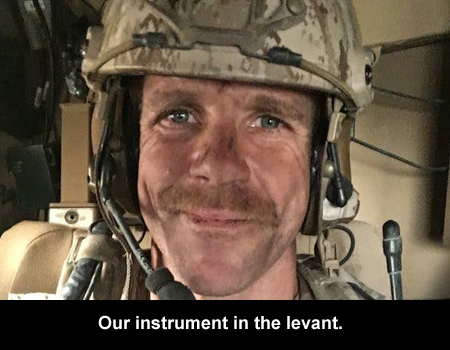Uniformly unjust.
Our president - who should really think twice before putting on that tux (one word, Mr. President: cumberbund) has been contemplating a pre-emptive pardon for former Navy Seal Edward R. Gallagher, who faces court martial for premeditated murder, attempted murder, obstruction of justice, and more. Gallagher's fellow Seals have called him out for some pretty heinous acts, including stabbing to death a young ISIS fighter who was in custody, wounded, and basically helpless, then parading the body in photos and conducting a re-enlistment ceremony over it. For Trump, of course, this makes Gallagher a hero, because he fits the First Man-baby's warped notion of toughness - I expect nothing more from the likes of him.
Gallagher has another defender in congressman and Iraq war veteran Duncan Hunter, who sees nothing wrong in killing people in custody and using old men, young girls, etc. for target practice. Hunter's position is basically that Gallagher's crimes are no different from what he, Hunter, did in Fallujah, where he credibly claims to have killed hundreds of civilians. Of course, the military leadership disagrees - there is a thing called the Uniform Code of Military Justice and, more generally, accepted laws and norms of warfare, and for a variety of reasons the generals want to keep good order and discipline in the ranks. Granted, the laws of war tend to be loose enough to drive a tank through, but they do exist and they exist for specific reasons having to do with maintaining good order and discipline and perpetuating the myth that our mission is always the betterment of the peoples we invade and subdue. (Abusive practices also open our own captured service members to similar abuses.)

Strangely, Hunter almost stumbles onto an uncomfortable truth here. In a certain respect, there isn't a lot of difference between firing artillery rounds into civilian neighborhoods in Fallujah and shooting civilians like turkeys in Syria. Both are predictable outcomes of the criminal decision to send our massive military into these countries in the first place. That decision is not made by the service members who fight the wars - it is ultimately made by us. Nowadays almost no one wants to own the war in Iraq (aside from crackpots like Bolton), but by not restraining our own government from proceeding with it back in 2003, we are all responsible for what has resulted from that decision. Hunter and Gallagher were the instruments of that policy, and as such, in a sense are less culpable than we are ... or, as citizens themselves, certainly no more so. With respect to killing young prisoners in cold blood, Gallagher probably bears a higher level of responsibility than someone just mechanically pulling the lanyard, trigger, or whatever to destroy a distant "enemy".
It's hard for me to argue with Gallagher's prosecution. But if justice were to be served, we should all be up there with him.
luv u,
jp
Gallagher has another defender in congressman and Iraq war veteran Duncan Hunter, who sees nothing wrong in killing people in custody and using old men, young girls, etc. for target practice. Hunter's position is basically that Gallagher's crimes are no different from what he, Hunter, did in Fallujah, where he credibly claims to have killed hundreds of civilians. Of course, the military leadership disagrees - there is a thing called the Uniform Code of Military Justice and, more generally, accepted laws and norms of warfare, and for a variety of reasons the generals want to keep good order and discipline in the ranks. Granted, the laws of war tend to be loose enough to drive a tank through, but they do exist and they exist for specific reasons having to do with maintaining good order and discipline and perpetuating the myth that our mission is always the betterment of the peoples we invade and subdue. (Abusive practices also open our own captured service members to similar abuses.)

Strangely, Hunter almost stumbles onto an uncomfortable truth here. In a certain respect, there isn't a lot of difference between firing artillery rounds into civilian neighborhoods in Fallujah and shooting civilians like turkeys in Syria. Both are predictable outcomes of the criminal decision to send our massive military into these countries in the first place. That decision is not made by the service members who fight the wars - it is ultimately made by us. Nowadays almost no one wants to own the war in Iraq (aside from crackpots like Bolton), but by not restraining our own government from proceeding with it back in 2003, we are all responsible for what has resulted from that decision. Hunter and Gallagher were the instruments of that policy, and as such, in a sense are less culpable than we are ... or, as citizens themselves, certainly no more so. With respect to killing young prisoners in cold blood, Gallagher probably bears a higher level of responsibility than someone just mechanically pulling the lanyard, trigger, or whatever to destroy a distant "enemy".
It's hard for me to argue with Gallagher's prosecution. But if justice were to be served, we should all be up there with him.
luv u,
jp
Comments